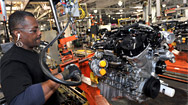Human Rights in the Supply Chain: Ford’s Global Working Conditions Program
Human rights and working conditions are a primary focus of our work with suppliers. We aim to ensure that everything we make – or others make for us – is produced consistent with local law and our Code of Human Rights, Basic Working Conditions and Corporate Responsibility. This can be challenging, as we have less control in suppliers’ facilities than in our own, particularly at the sub-tier level (i.e., our suppliers’ suppliers), where the risk for substandard working conditions is often heightened. For this reason, we have had to define our approach carefully and involve suppliers, other automakers, governments, nongovernmental organizations (NGOs) and other stakeholders.
The legal structures governing working conditions, and the level of enforcement, vary widely across the countries in which we operate. Ensuring sound working conditions in the supply chain is ultimately our suppliers’ responsibility, and we would like governments to play the lead role in enforcing compliance with laws. As customers, however, we have an active role to play in supplier development.
Since we began work with our suppliers to ensure alignment with our Code of Human Rights, Basic Working Conditions and Corporate Responsibility, our approach has emphasized building capability throughout the supply chain to manage working conditions effectively. Our primary focus has been on training and education regarding working conditions issues and management systems.
We also use third-party assessments of individual supplier factories to verify performance and progress. Our assessments are announced and coordinated with the supplier and Ford business owners. We do not conduct unannounced audits, as the risk profile of our Tier 1 supply base does not include significant indication of the types of issues intended to be “caught” during an unannounced audit.
Our long-term vision is for our industry as a whole to work together to ensure that high expectations around human rights and working conditions are met throughout the supply chain. We began promoting cross-industry collaboration in North America and have extended these efforts to include global manufacturers. Our view is that all participants in the automotive supply chain – from the original equipment manufacturers (OEMs) such as Ford, to the suppliers themselves, to the government agencies that set and enforce the regulations governing operations – must be involved to make these efforts sustainable in the long run. Such collective action will not only minimize costs and increase efficiency for OEMs and suppliers alike, but will lead to better results than if individual companies take steps in isolation.










